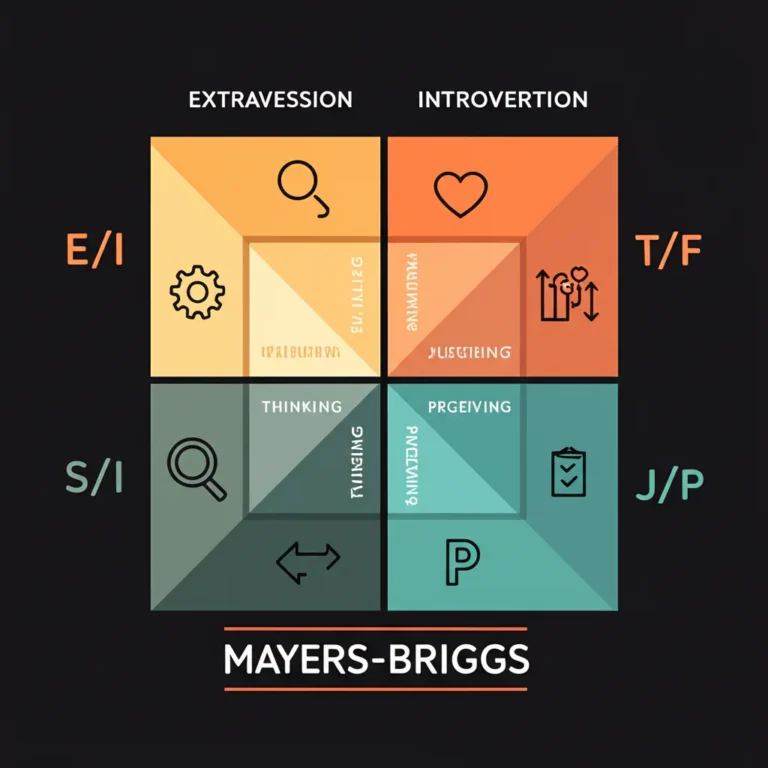Support our educational content for free when you buy through links on our site. Learn more
What Are the 16 Personalities Called in Order? Complete List (2025) 🧠
Ever wondered what those four-letter personality codes really mean and how they line up in order? You’re not alone! The 16 personalities framework has taken the world by storm, helping millions decode their own behaviors and better understand others. But with so many acronyms like INTJ, ESFP, and INFJ flying around, it’s easy to get lost in the alphabet soup.
In this article, we’ll reveal the full list of the 16 personalities in order, grouped by their fascinating categories — Analysts, Diplomats, Sentinels, and Explorers. Plus, we’ll dive into what each type really stands for, bust common myths, and share expert tips on how to identify your own personality type. Stick around for surprising insights on how your type influences your career, relationships, and personal growth!
Did you know the rarest personality type, the INFJ, makes up only about 1.5% of the population? Keep reading to discover where you fit in this colorful spectrum!
Key Takeaways
- The 16 personalities are grouped into four main categories: Analysts, Diplomats, Sentinels, and Explorers, each with unique traits and roles.
- Each personality type is identified by a four-letter code plus an Assertive or Turbulent identity that reflects confidence levels.
- Knowing your personality type can improve career choices, relationships, and self-awareness.
- The rarest type is INFJ (Advocate), while the most common is ISFJ (Defender).
- Reliable tests like the 16Personalities free assessment are great starting points to discover your type.
Explore personality books and tools to deepen your understanding:
- Please Understand Me II by David Keirsey
- Gifts Differing by Isabel Briggs Myers
👉 CHECK PRICE on:
Table of Contents
- ⚡️ Quick Tips and Facts About the 16 Personalities
- 🔍 The Origins and Evolution of the 16 Personality Types
- 🧠 Understanding the 16 Personalities: What Are They Really?
- 1️⃣ The 16 Personality Types in Order: Names and Meanings
- 🌟 The Analysts: Masterminds of Logic and Strategy
- 🌈 The Diplomats: Empathetic Idealists and Peacemakers
- 🛡️ The Sentinels: Guardians of Tradition and Responsibility
- 🚀 The Explorers: Bold Adventurers and Spontaneous Creators
- 🔄 How to Identify Your Personality Type: Tests, Tips, and Tricks
- 💡 Practical Uses of Knowing Your 16 Personality Type
- 🧩 Common Misconceptions and Myths About the 16 Personalities
- 📊 Personality Types in the Workplace: Who Fits Where?
- ❤️ Relationships and the 16 Personalities: Compatibility Insights
- 🎯 Leveraging Your Personality Type for Personal Growth
- 📚 Recommended Resources and Tools for Personality Exploration
- 📝 Conclusion: Embracing the Spectrum of 16 Personalities
- 🔗 Recommended Links for Deeper Personality Insights
- ❓ FAQ: Your Burning Questions About the 16 Personalities Answered
- 📖 Reference Links and Further Reading
⚡️ Quick Tips and Facts About the 16 Personalities
Welcome to the fascinating world of the 16 personalities! If you’ve ever wondered “What are the 16 personalities called in order?” or why everyone’s buzzing about these quirky four-letter acronyms, you’re in the right place. At Personality Types™, we’ve spent years counseling and analyzing these types, and here’s a quick cheat sheet to get you started:
- The 16 personalities are grouped into four main categories: Analysts, Diplomats, Sentinels, and Explorers.
- Each personality type is identified by a four-letter code (e.g., INTJ, ESFP) plus an identity trait (Assertive -A or Turbulent -T).
- The rarest personality type is the INFJ (Advocate), making up about 1.5% of the population.
- The most common type is ISFJ (Defender), known for their dedication and warmth.
- These types are based on the Myers-Briggs Type Indicator (MBTI), which itself is rooted in Carl Jung’s psychological theories.
- Knowing your personality type can help with career choices, relationships, and personal growth.
- No type is better or worse — each has unique strengths and challenges.
Curious about the full lineup and what each type really means? Keep reading — we’ll unravel the mystery in order, with plenty of insights and stories from our experts!
For a broader perspective on personality types, check out our related article: What Are the 4 Major Types of Personalities? Discover Yours in 2025! 🧠
🔍 The Origins and Evolution of the 16 Personality Types
Before we dive into the names and order of the 16 personalities, let’s take a quick trip down memory lane. Understanding the history and evolution of these types helps us appreciate why they matter today.
From Jung to Briggs-Myers to 16Personalities
- Carl Gustav Jung (early 20th century) introduced the idea of psychological types, focusing on attitudes like Introversion vs. Extraversion and cognitive functions.
- Katharine Cook Briggs and Isabel Briggs Myers expanded on Jung’s work during WWII, creating the MBTI to help women find suitable jobs by identifying personality preferences.
- The MBTI divides personalities into 16 distinct types based on four dichotomies:
- Extraversion (E) vs. Introversion (I)
- Sensing (S) vs. Intuition (N)
- Thinking (T) vs. Feeling (F)
- Judging (J) vs. Perceiving (P)
- The 16Personalities.com model adds a fifth dimension: Identity (Assertive -A or Turbulent -T), refining the types further.
Why the 16 Types Matter Today
- The 16 personalities provide a common language for understanding ourselves and others.
- They help explain behavior patterns, communication styles, and decision-making.
- Modern psychology appreciates the balance between type-based and trait-based models, with the 16 personalities offering practical, actionable insights.
For more on the theoretical foundation, see the 16Personalities Theory.
🧠 Understanding the 16 Personalities: What Are They Really?
At first glance, the 16 personalities might seem like just a bunch of letters. But behind each acronym lies a complex, dynamic profile that captures how you think, feel, and act.
The Five Dimensions Explained
- Energy (E/I): Where you get your energy — from the outer world or your inner thoughts.
- Mind (N/S): How you perceive information — through intuition or concrete facts.
- Nature (T/F): How you make decisions — logically or emotionally.
- Tactics (J/P): How you approach life — structured or flexible.
- Identity (A/T): Your confidence level — self-assured or self-conscious.
Why This Matters
Understanding these dimensions helps you:
- Recognize your strengths and blind spots.
- Improve your communication with others.
- Navigate stress and conflict more effectively.
Want to explore your own personality? Try the free NERIS Type Explorer® — it’s taken by nearly 100 million people worldwide!
1️⃣ The 16 Personality Types in Order: Names and Meanings
Here’s the moment you’ve been waiting for — the 16 personalities called in order, grouped by their four main categories. We’ll list each type with its common name and a quick descriptor from our team’s experience.
| # | Personality Code | Common Name | Quick Descriptor |
|---|---|---|---|
| 1 | INTJ | Architect | Strategic, visionary planners |
| 2 | INTP | Logician | Innovative, curious thinkers |
| 3 | ENTJ | Commander | Bold, natural leaders |
| 4 | ENTP | Debater | Energetic, intellectual challengers |
| 5 | INFJ | Advocate | Insightful, idealistic visionaries |
| 6 | INFP | Mediator | Compassionate, creative peacemakers |
| 7 | ENFJ | Protagonist | Charismatic, inspiring leaders |
| 8 | ENFP | Campaigner | Enthusiastic, imaginative free spirits |
| 9 | ISTJ | Logistician | Dependable, detail-oriented organizers |
| 10 | ISFJ | Defender | Warm, protective nurturers |
| 11 | ESTJ | Executive | Efficient, commanding managers |
| 12 | ESFJ | Consul | Sociable, caring community builders |
| 13 | ISTP | Virtuoso | Practical, hands-on experimenters |
| 14 | ISFP | Adventurer | Artistic, flexible explorers |
| 15 | ESTP | Entrepreneur | Energetic, risk-taking doers |
| 16 | ESFP | Entertainer | Spontaneous, lively performers |
Fun fact: The order above follows a common convention starting with Analysts, then Diplomats, Sentinels, and Explorers — but some experts prefer other sequences based on cognitive functions or popularity.
🌟 The Analysts: Masterminds of Logic and Strategy
Analysts are the strategic thinkers and innovators of the personality world. They thrive on logic, complexity, and intellectual challenges.
Meet the Analysts
| Type | Nickname | Key Traits | Strengths | Challenges |
|---|---|---|---|---|
| INTJ | Architect | Visionary, strategic, independent | Planning, problem-solving | Can be perfectionistic, aloof |
| INTP | Logician | Curious, analytical, inventive | Creativity, deep thinking | May struggle with follow-through |
| ENTJ | Commander | Assertive, decisive, leadership | Organization, motivation | Can be domineering or impatient |
| ENTP | Debater | Energetic, witty, curious | Debating, adaptability | May argue for argument’s sake |
Why Analysts Rock
Our counselors often see Analysts excel in careers like engineering, law, science, and entrepreneurship — fields that reward strategic thinking and innovation. They’re the masterminds behind many breakthrough ideas!
🌈 The Diplomats: Empathetic Idealists and Peacemakers
Diplomats are the heart-centered visionaries who value harmony, empathy, and meaningful connections.
Meet the Diplomats
| Type | Nickname | Key Traits | Strengths | Challenges |
|---|---|---|---|---|
| INFJ | Advocate | Insightful, idealistic, reserved | Empathy, vision | Can be overly sensitive |
| INFP | Mediator | Compassionate, creative, loyal | Imagination, kindness | May avoid conflict |
| ENFJ | Protagonist | Charismatic, inspiring, organized | Leadership, social skills | Can be people-pleasers |
| ENFP | Campaigner | Enthusiastic, spontaneous, warm | Creativity, enthusiasm | May struggle with focus |
Why Diplomats Shine
Diplomats often flourish in counseling, education, the arts, and humanitarian work. Their ability to connect deeply with others makes them natural peacemakers and motivators.
🛡️ The Sentinels: Guardians of Tradition and Responsibility
Sentinels are the reliable, practical caretakers who uphold order and stability.
Meet the Sentinels
| Type | Nickname | Key Traits | Strengths | Challenges |
|---|---|---|---|---|
| ISTJ | Logistician | Responsible, detail-oriented | Organization, dependability | Can be rigid or inflexible |
| ISFJ | Defender | Caring, loyal, practical | Supportiveness, patience | May neglect own needs |
| ESTJ | Executive | Efficient, organized, assertive | Leadership, decisiveness | Can be controlling |
| ESFJ | Consul | Warm, social, conscientious | Cooperation, empathy | May avoid conflict |
Why Sentinels Matter
Sentinels are the backbone of many organizations — think managers, administrators, healthcare workers — where structure and reliability are paramount.
🚀 The Explorers: Bold Adventurers and Spontaneous Creators
Explorers are the spontaneous, adaptable doers who live for excitement and hands-on experiences.
Meet the Explorers
| Type | Nickname | Key Traits | Strengths | Challenges |
|---|---|---|---|---|
| ISTP | Virtuoso | Practical, curious, independent | Problem-solving, adaptability | Can be private or unpredictable |
| ISFP | Adventurer | Artistic, sensitive, flexible | Creativity, empathy | May avoid planning |
| ESTP | Entrepreneur | Energetic, perceptive, bold | Risk-taking, charisma | Can be impulsive |
| ESFP | Entertainer | Fun-loving, enthusiastic, social | Spontaneity, warmth | May struggle with long-term focus |
Why Explorers Thrive
Explorers often excel in careers requiring quick thinking and adaptability — like emergency services, sales, performing arts, or skilled trades.
🔄 How to Identify Your Personality Type: Tests, Tips, and Tricks
So, how do you find out which of these 16 personalities you are? Our team recommends a multi-step approach:
Step 1: Take a Reliable Personality Test
- Start with the free and well-validated 16Personalities test.
- For a deeper dive, explore the MBTI® official assessment, though it usually requires payment.
- Try other free platforms like 123Test or Personality Perfect.
Step 2: Reflect on Your Results
- Read the detailed descriptions carefully.
- Ask yourself: Does this resonate with my behavior, values, and preferences?
- Remember, no test is perfect — use your judgment.
Step 3: Consult Trusted Sources
- Read expert analyses on sites like Personality Types™.
- Discuss with friends or counselors who know you well.
Step 4: Observe Over Time
- Personality can be fluid; observe how you react in different situations.
- Consider the Assertive (-A) vs. Turbulent (-T) identity trait — it reflects your confidence and stress response.
💡 Practical Uses of Knowing Your 16 Personality Type
Understanding your personality type isn’t just fun trivia — it’s a powerful tool for improving your life.
Career Guidance
- Match your type to careers that fit your natural strengths.
- For example, ENTJs often thrive in leadership roles, while INFPs excel in creative or counseling professions.
- Explore our Career Choices and Personality for tailored advice.
Relationship Insights
- Learn how your type interacts with others.
- Identify potential compatibility or friction points.
- Check out our Personality and Relationships section for more.
Personal Growth
- Use your type to understand stress triggers and coping strategies.
- Set realistic goals aligned with your natural tendencies.
- Our experts recommend journaling and mindfulness tailored to your personality.
🧩 Common Misconceptions and Myths About the 16 Personalities
Let’s bust some myths! The 16 personalities are often misunderstood.
Myth 1: Your Personality Type Is Fixed Forever ❌
- Reality: Personality can evolve with experience and self-awareness.
- The types describe preferences, not rigid rules.
Myth 2: One Type Is Better Than Others ❌
- Reality: No type is superior; each has unique gifts and challenges.
- Success depends on how you leverage your strengths.
Myth 3: Personality Tests Are Just Fun Quizzes ❌
- Reality: While some tests are superficial, reputable ones like the MBTI and 16Personalities have scientific backing and practical value.
Myth 4: The 16 Types Cover Every Human Being Perfectly ❌
- Reality: Human personality is complex; these types are models to simplify understanding, not exhaustive labels.
📊 Personality Types in the Workplace: Who Fits Where?
Workplaces thrive on diversity, and understanding personality types can boost productivity and harmony.
Analysts in the Workplace
- Excel in strategic planning, problem-solving, and innovation.
- Often found in tech, engineering, law, and management.
Diplomats in the Workplace
- Shine in roles requiring empathy, communication, and leadership.
- Common in education, counseling, human resources, and creative fields.
Sentinels in the Workplace
- Dependable organizers and administrators.
- Thrive in healthcare, finance, government, and operations.
Explorers in the Workplace
- Adaptable, hands-on problem solvers.
- Found in sales, emergency services, arts, and skilled trades.
Pro Tip from Our Behaviorists
- Teams with a balanced mix of these types tend to perform best.
- Knowing your team’s types can help resolve conflicts and improve collaboration.
❤️ Relationships and the 16 Personalities: Compatibility Insights
Love, friendship, and family dynamics all benefit from personality awareness.
Complementary Pairings
- Opposite types can balance each other (e.g., an INTJ with an ESFP).
- Similar types often understand each other deeply but may share blind spots.
Communication Tips
- Tailor your style: Thinkers prefer logic; Feelers want empathy.
- Respect differences in energy: Introverts need downtime; Extraverts seek interaction.
Real-Life Anecdote
One of our counselors recalls a couple where the ENFP partner’s spontaneity clashed with the ISTJ’s need for structure — but understanding their types helped them appreciate their differences and grow stronger.
Explore more in our Personality and Relationships series.
🎯 Leveraging Your Personality Type for Personal Growth
Knowing your type is just the start. Here’s how to turn insight into action:
Set Type-Aligned Goals
- For example, INFPs might focus on creative projects; ESTJs on organizational leadership.
Develop Blind Spots
- Analysts can work on emotional intelligence.
- Diplomats might strengthen practical decision-making.
Manage Stress Effectively
- Recognize your identity trait: Assertive types handle stress differently than Turbulent ones.
- Practice tailored mindfulness or physical activity.
Seek Feedback and Mentorship
- Use your type to find mentors who complement your style.
📚 Recommended Resources and Tools for Personality Exploration
Ready to dive deeper? Here are some trusted resources:
- 16Personalities.com: Free test and detailed profiles
- MBTI Official Site: Certified assessments and resources
- Personality Perfect: Another free test with insights
- Books:
- Please Understand Me II by David Keirsey
- Gifts Differing by Isabel Briggs Myers
- Apps:
- Personality Types™ app for ongoing insights and community support
We hope this deep dive into the 16 personalities has sparked your curiosity and given you practical tools for self-discovery. Up next: the Conclusion where we wrap it all up with some final thoughts!
Conclusion: Embracing the Spectrum of 16 Personalities
Wow, what a journey! From the origins of the 16 personalities to their detailed names and nuances, we’ve peeled back the layers on one of the most popular personality frameworks out there. Whether you identify as a visionary Architect (INTJ), a warm-hearted Defender (ISFJ), or a spontaneous Entertainer (ESFP), each type offers a unique lens through which to view yourself and others.
Here’s the bottom line: The 16 personalities are not just labels — they’re tools for self-awareness, growth, and better relationships. They help you understand your natural preferences, strengths, and potential blind spots. Remember, no type is “better” or “worse.” Instead, they’re different flavors of human experience, each valuable in its own right.
If you’ve been wondering “What are the 16 personalities called in order?” now you have the full lineup, grouped by their compelling roles: Analysts, Diplomats, Sentinels, and Explorers. And if you’re curious about where you fit, taking a reputable test like the 16Personalities free assessment is a great next step.
Our team at Personality Types™ confidently recommends embracing your type as a springboard for growth rather than a box to confine you. Use it to navigate careers, relationships, and life’s challenges with more insight and compassion.
Ready to dive deeper? Check out the recommended resources below and keep exploring your fascinating personality landscape!
Recommended Links for Deeper Personality Insights
👉 Shop Books on Personality Types:
Personality Tests and Resources:
-
16Personalities Free Test:
16Personalities.com -
MBTI Official Assessment:
MBTI Online -
Personality Perfect Test:
PersonalityPerfect.com
❓ FAQ: Your Burning Questions About the 16 Personalities Answered
What are the 16 personality types based on the Myers-Briggs Type Indicator?
The 16 personality types stem from the Myers-Briggs Type Indicator (MBTI), which categorizes people based on four dichotomies:
- Extraversion (E) vs. Introversion (I): Where you focus your energy.
- Sensing (S) vs. Intuition (N): How you gather information.
- Thinking (T) vs. Feeling (F): How you make decisions.
- Judging (J) vs. Perceiving (P): How you approach structure in life.
Combining these preferences yields 16 unique types, each with distinct behavioral patterns. The MBTI was developed to help people understand themselves and others better, originally for workforce placement during WWII.
Read more about “🤯 The 4 Personality Types: Discover Yours in 2025!”
How do the 16 personalities differ from one another in terms of traits and characteristics?
Each type differs across the four dimensions, resulting in unique combinations of:
- Energy orientation: Outgoing and sociable (Extraverts) vs. reflective and reserved (Introverts).
- Information processing: Practical and detail-focused (Sensors) vs. imaginative and abstract (Intuitives).
- Decision-making: Logical and objective (Thinkers) vs. empathetic and value-driven (Feelers).
- Lifestyle approach: Organized and decisive (Judgers) vs. flexible and spontaneous (Perceivers).
For example, an INTJ (Architect) is strategic and independent, while an ESFP (Entertainer) is lively and spontaneous. These differences influence communication styles, work preferences, and social interactions.
What are the rarest and most common personality types among the 16 personalities?
- The rarest personality type is generally accepted as the INFJ (Advocate), comprising about 1.5% of the population. INFJs are known for their deep insight and idealism.
- The most common type is the ISFJ (Defender), often making up around 13-14% of people. ISFJs are dependable, caring, and detail-oriented.
- Other rare types include ENTJ (Commander) and INTJ (Architect), while types like ESFJ (Consul) and ESTJ (Executive) are relatively common.
Read more about “🕵️♂️ Sigma Male Weaknesses: 14 Revealing Traits (2025)”
Can knowing my 16 personality type help me understand my strengths, weaknesses, and career choices?
✅ Absolutely! Knowing your personality type provides a roadmap to your natural talents and challenges. For example:
- Strengths: INTJs excel at strategic planning, while ENFPs shine in creative brainstorming.
- Weaknesses: Some types may struggle with stress management or interpersonal conflict.
- Career Choices: Matching careers to your type can increase satisfaction and success. For instance, ISTJs often thrive in structured environments like accounting or law enforcement, whereas INFPs may prefer artistic or counseling roles.
Understanding your type helps you make informed decisions about your personal and professional life, improving overall well-being.
How reliable are the 16 personality tests and can they change over time?
While no personality test is perfect, reputable assessments like the 16Personalities test and the MBTI have demonstrated high reliability and validity when used properly. However:
- Personality is not static; it can evolve with experiences, maturity, and conscious effort.
- Tests measure preferences, not fixed traits, so results may vary slightly over time.
- Use test results as guides, not labels — they offer valuable insights but don’t define your entire identity.
Are the 16 personalities applicable across cultures and age groups?
The 16 personality framework has been tested globally and translated into multiple languages, showing broad applicability. However:
- Cultural factors can influence how traits are expressed or valued.
- Personality development varies with age; younger individuals may show more fluidity.
- Always consider cultural and developmental context when interpreting results.
📖 Reference Links and Further Reading
- 16Personalities: The 16 Personality Types
- Our Framework | 16Personalities
- MBTI Official Website
- Personality Perfect
- Psychology Today: Myers-Briggs Type Indicator
- American Psychological Association: Personality
We hope this comprehensive guide has illuminated the fascinating world of the 16 personalities for you! Remember, your personality is a vibrant spectrum — embrace it, explore it, and let it guide you to your best self. 🌟









